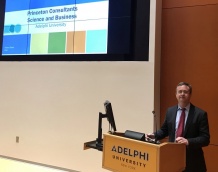Steve is a frequent guest on Sirius XM’s Road Dog Trucking Radio, discussing a variety of tech-related topics with host Mark Willis and drivers nationwide. Following is a lightly edited excerpt of his June 30 appearance.
Mark: Some of the drivers over the the last few years have said they welcome new technology—bring it on. You know, optimization. They want to get the most bang for the buck, if you will, when it comes to the digitization of freight. Many have said they miss the old days—they miss the days of the paper logs, they miss the face‑to‑face conversations with the people at the docks and things like that. With Artificial Intelligence, it sounds like a lot of folks are getting on board but how do you convince the old school guys that may have to cross that bridge?










